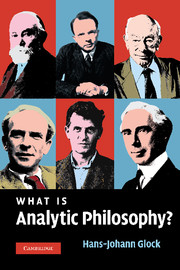4 - History and historiography
Published online by Cambridge University Press: 05 June 2012
Summary
If not by reference to space (geography and language), perhaps analytic philosophy can be conceived by reference to time. A disregard for historical issues is often mentioned as one of the distinctive features of analytic philosophy (Agostini 1997: 73–4; Engel 1997: 184–96). Furthermore, this alleged fact is almost universally used as a stick with which to beat analytic philosophy. Without good cause, I feel. Not just because analytic philosophers take a greater interest in the past than is commonly assumed, but also because their neglect of some historical issues is not the mortal sin their critics make it out to be.
The accusation that analytic philosophy lacks historical awareness unites its two main rivals within contemporary Western philosophy, continental and traditionalist philosophy. More surprisingly, perhaps, the criticism is also shared by some who by common consent are analytic philosophers themselves. From a continental-cum-pragmatist perspective, Rorty accuses analytic philosophy of being ‘an attempt to escape from history’ (1979: 8–9), and Wilshire takes exception to its ‘radically ahistorical and modern-progressivist point of view’ (2002: 4). From a traditionalist perspective, Ayers has lambasted analytic philosophers for their historiographical failings (1978), and from a traditionalist-cum-continental perspective Rée complains about their ‘condescension’ towards the past (1978: 28). The analytic critics, finally, include historians of the analytic movement like Sluga (1980: 2), Baker (1988: ix) and Hylton (1990: vii), who deplore its lack of historical self-consciousness.
- Type
- Chapter
- Information
- What is Analytic Philosophy? , pp. 89 - 114Publisher: Cambridge University PressPrint publication year: 2008



